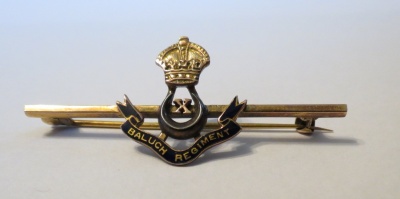126th Baluchistan Infantry
(Redirected from 26th (Baluchistan) Regiment of Bombay Infantry)
Known as the 26th Regiment of Bombay Native Infantry in the Bombay Army
Known as 126th Baluchistan Infantry in the Indian Army
Chronology

- 1825 raised as the 2nd Extra Battalion of Bombay Native Infantry
- 1826 became the 26th Regiment of Bombay Native Infantry
- 1885 became the 26th Regiment of Bombay Infantry
- 1892 became the 26th (Baluchistan) Regiment of Bombay Infantry
- 1901 became the 26th Baluchistan Infantry
- 1903 became the 126th Baluchistan Infantry
- 1922 became the 2nd/10th Baluch Regiment
- 1947 allocated to Pakistan on Partition
External links
- 126th Baluchistan Infantry Wikipedia
- 126th Baluchistan Infantry British Empire website
- 10th Baluch Regiment Wikipedia
- 10th Baluch Regiment Defence Journal Karachi June 1999, now archived. Probably an extract from Sons Of John Company by John Gaylor
- History of The Baloch Regiment 1820-1939 The Colonial Period Defence Journal Karachi October 2000, now archived.
- History of The Baloch Regiment 1939-1956 Defence Journal Karachi November 2000, now archived.
- "The British Campaign in Aden, 1914-1918" by Mark Connelly Journal of the Centre for First World War Studies Vol. 1, No. 3, 2005. pages 65-96, now an archived webpage. Includes brief mention of the 126/Baluchistans.
- "Military Operations in Aden 1914-1915" by Harry Fecitt, from Harry’s Sideshows kaiserscross.com. Includes mention of the 126th Baluchistan Infantry.
- "Kurdistan 1919: Military Operations in Mesopotamian Kurdistan: South Kurdistan, May–June 1919" by Harry Fecitt. From Harry's Sideshows kaiserscross.com
- Image 26th (Baluchistan) Regiment of Bombay Infantry. artnet.com. Originally from Types of the Indian Army: Illustrating the Races Enlisted in the Bengal, Punjab, Madras & Bombay Armies by Frederick Bremner Quetta 1897. Derived image commons.wikimedia.org
Historical books online
- Footnote, page 52 The Bombay City Police: A Historical Sketch 1672-1916 by S M Edwardes 1923 Archive.org. States that in the 1870s and 1880s, the 26th Bombay N I was known as the "Black Watch" owing to it having three Eurasian British Officers, including John Miles the Commandant.